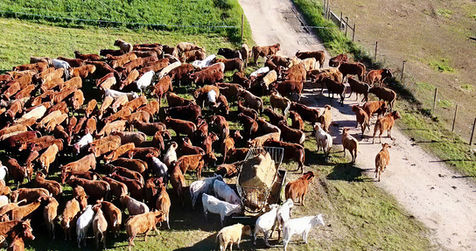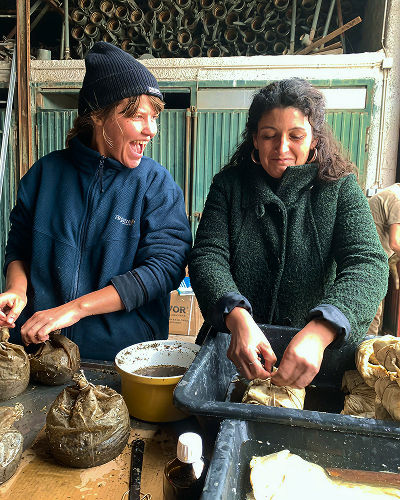Monte Silveira transformed its 1,000-hectare conventional production into a regenerative organic impact hub. Today, João Valente runs this farm, which also supports new farmers and entrepreneurs, R&D initiatives, and the legacy of the montado silvopastoral system.
Their story
Reconnecting with the Past to Rewrite the Future
Nestled in the arid Beira Baixa region of Portugal, Monte Silveira is a striking example of how regenerative agriculture can revive even the most depleted landscapes. Spanning over 1,000 hectares, this once-dry land is now lush and fertile, thanks to the work of João Valente and his team of 10. A lighthouse farm of European regenerative organic farming, Monte Silveira is the first large-scale farm in Europe to achieve Regenerative Organic Certification.
In less than ten years, Monte Silveira has managed to rebuild soil health, increase the soil organic matter content by 50% through a diverse, holistic set of techniques that address the entire ecosystem, aiming to abandon monoculture forever. It's a place where production, innovation, and research go hand in hand, despite the region's limited consumer awareness of regenerative practices.
A Shift in Perspective
Twenty-two years ago, João Valente was reading a Brazilian farmer’s magazine when he learned about no-till farming practices. A former civil engineering student turned agricultural economist, he became fascinated with the potential economic upsides. "We were growing tobacco at the time and witnessed the warning signs of the great decline in our organic soil matter and the natural ecosystem around us."
Since Monte Silveira was João's family farm, he persuaded his relatives to let him test regenerative practices. What began as a small experiment sparked a significant transformation, from a conventional farm known for large-scale production of tobacco, broccoli, melons, and cattle, to one that now embraces a place-based, regenerative approach to agriculture. "As humans, we have a tendency to say, 'I want to grow corn, I want to grow this over there,' when it really should be approached as, 'let me understand the place where I want to do what I want to do'," says João.
Using an Ancient Portuguese Method
Since the transition to regenerative farming practices at Monte Silveira, the team has noticed a dramatic increase in organic matter, improved water retention, better soil structure, enhanced microbial activity, reduced erosion, and increased root depth in the soil. Nature is noticing, too. Various pollinators, wildlife, plant diversity, and native species have reappeared in great volumes.
One of the farm's most successful ecosystems is the ancient, man-made Mediterranean system known as the Montado, which covers almost 60% of the farm's land. It's achieved through a delicate balance of perennial pasture, cork and holm oak trees, along with a regenerative livestock grazing relationship. "This system has existed for 10,000 years and been carefully stewarded by shepherds who understood the connection between humans and nature," explains João.
When the acorns begin to fall from the trees to the understory in September/October until March, black Portuguese pigs are integrated into the system, feasting on acorns that enhance the flavor of the meat. Then, the sheep and cows are rotated in and introduced to gently graze on the pasture. And when the bramble bushes become too overgrown, goats are brought in to prune the overgrowth. "It's working with different tools in different seasons to try to mimic nature and how the earth manages itself," says João. Once the animals have journeyed through, the farm team leaves the area to rest and regenerate for the upcoming season.
A Path Towards Profitability
For João Valente, one of the biggest financial and ecosystem payoffs has been witnessing the connection between proper animal management and the increase in soil health. "When correctly managing the animals on the land, you're able to increase the soil microbial activity, which increases soil nutrient cycling, leads to more pasture production, sequesters more carbon into the soil, retaining more water, and in turn, increasing profitability."
The farm achieves profitability by diversifying its revenue streams, including black pork, lamb meat, and beef, as well as growing a variety of annual crops such as wheat, oats, beans, chickpeas, fava beans, black-eyed peas, mustard, and forage. Additionally, it engages in seed multiplication, hosts on-farm events, and participates in carbon credit initiatives. By steadily moving up the value chain, the farm focuses on producing branded 'Monte Silveira' food products rather than selling bulk commodities.
"The more money we make, the more we can empower and grow our dedicated team and strive for new potential market opportunities and invest in technologies that help us implement regenerative practices at scale." As of 2025, there are currently no policies or incentives in place to support regenerative practices in Portugal or Europe. "I am definitely under a lot of stress, but that comes when swimming against the tides of conventional agriculture. We are striving to manage a growing complexity like nature."
Becoming an Impact Hub
The farm is approaching a holistically sustainable economic model for growth in three key pillars: the farm itself, the hub — a space where they give opportunity to people who don't have access to land or housing, giving them time to work on the farm and share knowledge; and research and development, in partnership with universities and institutes. João is also a founding member of Orgo, an organisation that provides farmer-to-farmer coaching in the transition to regenerative farming.
"The reason why we became regenerative is that in regenerative agriculture, you work with nature. You don't impose anything on nature. You are able to understand it and become a part of it. I think that's one of the most special things about it: the chance to try to understand nature and try to work with her," explains João.

Farm facts
Farm located in
Portugal














